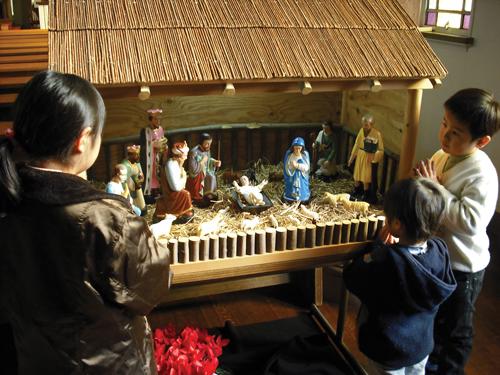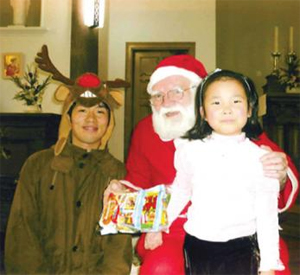Christmas in Japan
Two Reflections by Fr Barry Cairns
The author is from New Zealand and was ordained in 1955. He has been in Japan since 1956. Christmas: on looking at the crib first appeared in the November-December 2013 issue of The Far East, the magazine of the Columbans in Australia and New Zealand. Christmas in Japanwas first published in the November-December 2012 issue.
Christmas: on looking at the crib

Some time ago I was travelling by train from Yokohama to Odawara. In the carriage sitting opposite me I watched a young mother cuddling her baby. The baby was so tiny, so vulnerable, so dependent on its mother.
I wonder if any of us, given the choice, would come into this world in such a fragile condition. I doubt it.
But that is exactly what Jesus was willing to do for us. The Son, the second Person of the Trinity, chose to put aside the power and glory of God and become a weak, fragile human just like us. Jesus was a baby and like the baby in the train was completely dependent on his mother, Mary.
Let us look at the Christmas Crib and ponder this: our God deliberately took on our human weakness and consequent reliance on another. Jesus did this because he loves each one of us in our human frailty. That frailty which Jesus willingly accepted made him one of us and also made him our human representative before God.
This is what led him to offer his life for us, his brothers and sisters, on the Cross. The Crib and the Cross are intimately connected.
Merry Christmas and Happy New Year from Japan!
Jesus says to each of us: ‘Unless you become as a little child you cannot enter the Kingdom of Heaven’ (Matt: 18:3). Jesus does not mean that we become childish. He means that as adults we acknowledge our human weakness and become completely dependent on God. He calls on us in our powerlessness to rely on God's strength.
But we humans like to be in control. Christmas is a time when we look at the human infant Jesus in the crib. He is asking us to give up control and put ourselves into the hands of God. ‘Into your hands, Abba, Father-God, I give my life’ (cfLk 23:46).
Our Abba-God is gentle and understanding towards us his children. He wants our happiness. We can trust him when we put our lives in his hands. Let us look at the infant Jesus in the crib and realize how utterly dependent and weak he was.
If we ourselves acknowledge our human powerlessness and hand ourselves over to God we will become free, and more truly human. When God chose to become a weak human like us, he chose to be very close to us.
Our God has experienced the human condition. He accepts as we are in our human frailty.
That is love. That is the meaning of Christmas.
Silent Night sung in Japanese by a choir of Japanese children with André Rieu and his Orchestra

Christmas in Japan

How Japan has put meaning into Christmas for me.
The author in seasonal dress, with some young friends!
Christmas in Japan has caused me to dive into depths of pondering into which I would never have plunged had I not left my own culture.
A Japanese Christmas is so 'Jingle Bellie' so 'Santa Clausie.' Many would not even connect the festivities with Christ. My first reaction as a young priest was to become critical at the gross commercialization. In reaction I emphasized a spiritual Christmas.
But just a minute. This is where I started to ponder. This is when, I feel, a spot of wisdom came with age. There is no such thing as a purely spiritual Christmas.
Our God took on real human flesh. He did not become a pure spirit angel. The birth of Jesus in a drafty stable is not a purely spiritual event. That is the meaning of John 1:14, ‘The word was made flesh’ is niku, which is the common word for meat. Now that is thought-provoking.
In the third century the Gnostics said that the spirit and soul are good, but the body and material things are bad. Threads of this insidious heresy were revived in 18th century Jansenism, traces of which still persist today. We should not belittle the body and material things as if they distract us from the spiritual.
On the contrary the material is the normal gateway to the spirit. The Incarnation means that we humans meet God through the human Jesus. His human heart shows us divine love.
Jesus came for the whole human person. Christmas shows us that there is a mysterious but real unity between the human and the divine, between the spiritual and the secular, between the body and the soul. So let us rejoice in our humanity and in the material. That is the hidden message of Christmas.
I live in Yokohama, a city of 3.7 million people. Even in the suburbs private houses are bedecked with blinking colored lights. Santa Claus too is everywhere. For example a half marathon is run with all wearing red Santa hats. Railing against the absence of Christ in Christmas gets nowhere. I can't beat them, so I join them. I, too, have lights around the Church - they surround a life-size crib, made and painted by three of the parishioners.
Santa Claus is Coming to Town, in Japanese. Karuizawa Junior Chorus
After Christmas Masses I take off the vestments and don a Santa Claus outfit. (From October my white beard is untrimmed and is a genuine Santa length by 25 December). Crowds of children from the local kindergartens and grade schools line up and receive a small gift from Santa Claus Barry Cairns. I tell them about the real Saint Nicholas who was noted for his kindness. I ask the children to do one act of kindness to others. Kindness is essential to Christmas.
I see the surface celebration of Christmas as a modern expression of 'there was no room at the inn.' Two thousand years ago people did not receive Jesus, but he still came. He still comes today. We know the true meaning of Christmas so let us prepare the manger for him in the stable of our hearts.
Let us really share with others the material joys of Christmas. Our warmth can transmit the true message of Christmas to the world.
Angels We Have Heard on High, in Japanese. Karuizawa Junior Chorus